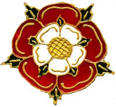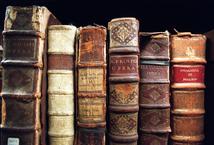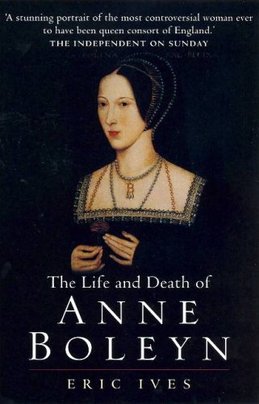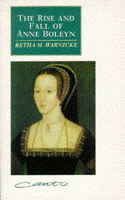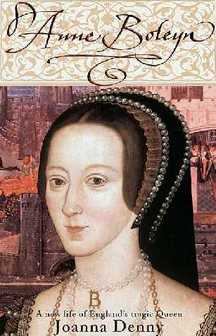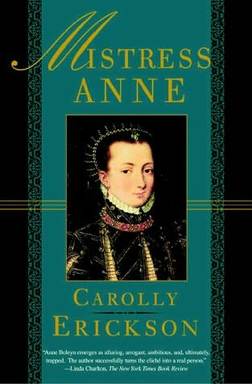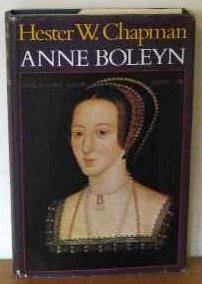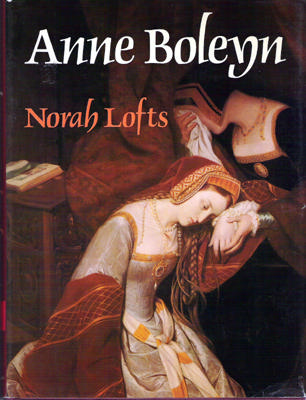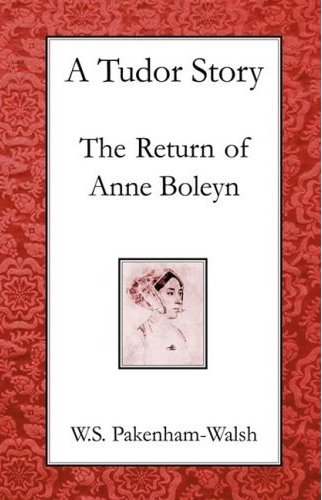Anne Boleyn - Non Fiction Shelf
Jump to navigation
Jump to search
Tudors Fans Here is a page for you your favourite or not so favouriteto review & recommend NON FICTION books about Anne Boleyn For more on the authors see : Tudor Historians page | Want to add to this page? Click EasyEdit to update this page! (Don't see the EasyEdit button above? <a href="../#signin" target="_self">Sign in</a> or <a href="../accountnew" target="_self">Sign up</a>.) |
Non-Fiction About the Author: Eric Ives Well respected British Historian who is Emeritus Professor at the University of Birmingham, England. He only writes about this period in history & doesn't write fiction. He has been awarded the Order of the British Empire (OBE) by Queen Elizabeth II in recognition of his services to British history. Reviews: "The Best full-length life of Anne Boleyn and a monument to investigative scholarship" - David Starkey "The best book on Anne Boleyn ever written. This is a must for all lovers of Tudor history, academics and general readers alike." - Alison Weir, BBC History Magazine Books of the Year "Splendidly successful... Ives' Boleyn, a portrait at all points supported by the evidence he gives, is clever, independent-minded and politically astute. Ives has gone as far as anyone can....in solving the enigma of Boleyn in a narrative at once profoundly researched and lively" - Antonia Fraser "Eric Ives, a scholar utterly at home in early Tudor Politics, has been writing about the Boleyns for more than two decades. His book represents a triumphant culmination of all that research, presented with clarity, wit and human sympathy" - Diarmid MacCulloch "Magnificently researched. Eric Ives has written the finest, most accurate study of Anne Boleyn we are ever likely to possess. He leaves no stone unturned in his quest to discover the truth. Never has the historical Anne been so satisfyingly portrayed." - John Guy "What Ives doesn't know ... about the high politics and court life of Henry VIII's England will either never be known or is not worth knowing. If there is a truth about Anne Boleyn's rise and fall, he will tell it to us." - London Review of Books "Ives demonstrates triumphantly the potential of the biographical approach in a pre-modern setting. He evinces a deep empathy for his subject without ever becoming an apologist for her, and ... he provides a narrative which is genuinely moving. He has also given us a fully rounded and persuasive account of Anne's life as a whole, and its significance for understanding the politics and political culture of the early Tudor decades." - Reviews in History "Eric Ives has made it unnecessary for anyone else to even make the attempt [to write a biography of Anne Boleyn]. The Life and Death of Anne Boleyn is a stunning portrait of the most controversial woman ever to have been queen consort of England." ~ The Independent on Sunday "Ives has written an excellent book on Anne Boleyn. Its great strength is its sophisticated understanding of aristocratic women's involvement in 16th-century politics, and precisely how this worked in practice. ...Ives rises effectively to the human drama of Anne Boleyn's life and in the process illuminates both the inner workings of the Tudor court and its relationship to the larger dramas of the Reformation and European politics." ~ Jane Stevenson, Scotland on Sunday "What is most exciting about The Life and Death of Anne Boleyn is not just that it has confirmed and solidified Ives's earlier work and presented it in a more accessible format. (Like John Guy, Ives has discovered that the Starkey model really does work and that popularisation -- 'to place among the people' -- should not be a term of opprobrium.) Rather, it is the development in methodology, the indication that cultural studies and the history of the book have provided us with new ways to evaluate evidence, to interpret the past." ~ The Spectator "Eric Ives achieves the notable feat of combining magisterial historical authority with a gripping style, and sets the reader's mind buzzing with debate about the complex reasons behind the astounding events of Anne's life." ~ Times Literary Supplement "[Ives] delicately pieces together a believable identity ... [and] gives, too, a lucid and coherent exposition of the circumstances that led to Anne's death." ~ The Guardian "There is no questioning the impact of Professor Eric Ives on the historiography of Tudor England. There is a keen sense of the evidence, of diplomatic affairs, of the minutiae of the record and its context. The writing is fluent and well-paced, drawing the reader along." ~ The Tyndale Society Journal "This is a moving and compelling account by an author who is the absolute master of his subject. I read it with great excitement and admiration." ~ Susan Brigden, Lincoln College, Oxford "Eric Ives has cut through the myths and misconceptions. The result surpasses all previous work.When Ives describes Anne herself. he is utterly convincing." ~ Renaissance Quarterly |
| |||||||
The Rise and Fall of Anne Boleyn: Family Politics at the Court of Henry VIII About the Author : Retha M. Warnicke An American historian and professor of history at the Arizona State University specializing in gender issues c. 1400 - 1700. Her theories on Anne delivering a deformed foetus & subsequent accusations of witchcraft & her brother's homosexuality on which Philippa Gregory based her novel "the Other Boleyn Girl" have been harshly criticized by other historians including Eric W. Ives & G. W. Bernard. However, Warnicke has publicly distanced herself from the novel and its presentation of the Boleyns. |
| |||||||
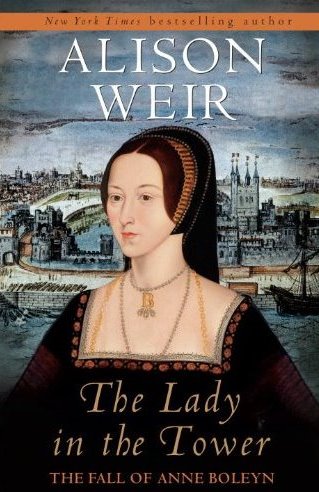 About the Author : Alison Weir Before becoming a writer of both historical fiction and non-fiction, Weir was a teacher & ran her own school for special needs children. She was born in Westminster, London and now lives in Surrey, England with her husband and two children. Review: "Three significant theories exist to explain Anne’s fall. One is that Henry, already lusting after Jane Seymour, was sorely disappointed by Anne’s failure to produce a son. He told his chief minister, Thomas Cromwell, to oust her, and Cromwell obliged. Alternatively, Anne brought disaster on herself through sexual indiscretions or (far more plausibly) by overstepping the conventional limits of courtly banter. The third theory — the one Weir largely believes to be correct — is that Cromwell, after quarrelling with Anne and putting his career in grave jeopardy, decided to stage a coup. ... In unmasking Cromwell, Weir agrees with Eric Ives, Anne’s most recent biographer, but the two historians tell the story differently. Weir more often cites the earliest literary account of Anne’s fall: a long and colourful poem by Lancelot de Carles, especially important for its account of Anne’s defiant speech at her trial. Ives thinks the poem often peddles moonshine, but, while sometimes sceptical herself, Weir believes that a separate poem by another Frenchman, an “eyewitness” at Anne’s trial, one Crispin de Miherve, corroborates de Carles and adds extra details. Unfortunately, “Crispin” is a phantom. A French scholar proved in 1844 that the text Weir is using had been doctored, and in 1927 it was shown by comparing all the genuine manuscripts that the two poems are identical and by de Carles. Weir has been duped." ~ Historian John Guy in The Sunday Times For more : <a class="external" href="http://entertainment.timesonline.co.uk/tol/arts_and_entertainment/books/non-fiction/article6894033.ece" rel="nofollow" target="_blank" title="Read the full review at timesonline.co.uk">Read the full review at timesonline.co.uk </a> Also listen to Alison Weir talking about her book on <a class="external" href="http://www.npr.org/templates/story/story.php?storyId=122872854" rel="nofollow" target="_blank" title="NPR">NPR</a> |
| |||||||
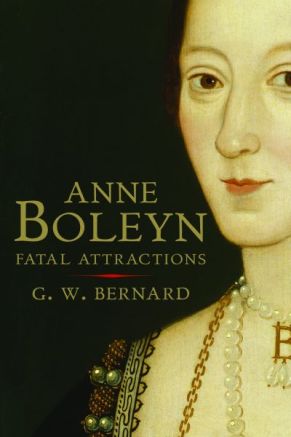 Non- fiction Available May 03, 2010 Yale University Press About the Author: G.W. Bernard professor of early modern history at the University of Southampton and editor of the English Historical Review. He is the author of The King’s Reformation: Henry VIII and the Remaking of the English Church. He lives in Southampton, England. In this groundbreaking new biography, G. W. Bernard offers a fresh portrait of one of England’s most captivating queens. Through a wide-ranging forensic examination of sixteenth-century sources, Bernard reconsiders Boleyn’s girlhood, her experience at the French court, the nature of her relationship with Henry, and the authenticity of her evangelical sympathies. He depicts Anne Boleyn as a captivating, intelligent, and highly sexual woman whose attractions Henry resisted for years until marriage could ensure legitimacy for their offspring. He shows that it was Henry, not Anne, who developed the ideas that led to the break with Rome. And, most radically, he argues that the allegations of adultery that led to Anne’s execution in the Tower could be close to the truth. Click here : <a class="external" href="http://www.theanneboleynfiles.com/anne-boleyn-fatal-attractions-by-g-w-bernard/5216/" rel="nofollow" target="_blank" title="for Claire Ridgeway's review at "Tudor Book reviews"">for Claire Ridgeway's review at "Tudor Book reviews"</a> "On three separate occasions in this work, Bernard gets the date of Anne’s execution incorrect – variably placing it to the twelfth, fifteenth or seventeenth of May. On page 57, inaccurately refers to Anne’s father, who was viscount Rochford from 1525 to 1529 and earl of Ormond and Wiltshire after 1529, as “Viscount Wiltshire," and on page 40 he describes the emperor, Charles V, as Katherine of Aragon’s uncle, rather than her nephew. Most damningly of all, in his account of Anne’s imprisonment he confuses Anne’s mother, the countess of Ormond and Wiltshire, with Anne’s estranged paternal aunt, Lady Amata Boleyn on page 191. Lady Boleyn was one of four women assigned by Cromwell to watch over the queen during her incarceration and to report on anything she did or said. It is these reports, written down by the William Kingston, constable of the Tower, which have formed the cornerstone of any analysis of Anne’s downfall. For Bernard to confuse Lady Boleyn with the countess of Ormond, when earlier in the same collection of papers Kingston specifically mentions the queen’s distress at being separated from her mother, indicates that the author quite simply has not read these sources with the necessary care or understood the crucial significance of the household arrangements during Anne’s imprisonment." ~ <a class="external" href="http://garethrussellcidevant.blogspot.com/2011/03/fatal-delusions-review-of-new-biography.html" rel="nofollow" target="_blank" title="Review by Gareth Russell">Review by Gareth Russell</a> “Early in Fatal Attractions Bernard refers to Carle as Anne’s ‘biographer’ and he often frames quotations from the poem in a way that lends authority to it, and to Carle himself, that arguably neither has....he makes clear at the outset that he is repeating what he has heard from a variety of sources during the time he has been in England, but he does not name his sources, address the truth of his information, correct a number of factual errors he could have checked, or claimed to have witnessed any of the events he recounts. These circumstances combine to make it reasonable to question the reliability of the poem’s content, making it surely unwise to give this source too much credibility, especially without a greater understanding of the poem and its author.” ~<a class="external" href="http://www.historytoday.com/susan-walters-schmid/anne-boleyn-gave-birth-princess-elizabeth" rel="nofollow" target="_blank" title="History Today ">History Today </a> “History Review” Issue 69 March 2011, Dr Susan Walters Schmid |
| |||||||
| ||||||||
| ||||||||
Non Fiction The Challenge of Anne Boleyn by Hester W. Chapman First American Edition, 1974 |
| |||||||
| ||||||||
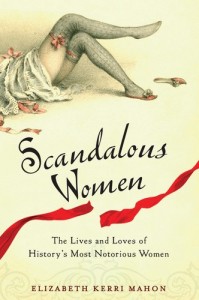 35 different women are covered and this book is divided into 7 main parts:- Warrior Queens - inc Boudica and Eleanor of Aquitaine Wayward Wives - inc Violet Trefusis & Émilie du Chatelet Scintillating Seductresses - inc Anne Boleyn & Mata Hari Crusading Ladies - inc. Carry Nation & Ida B. Wells-Barnett Wild Women of the West - inc Calamity Jane & Mary Ellen Pleasant Amorous Artists - inc Josephine Baker & Camile Claudel Amazing Adventuresses - inc Amelia Earhart & Lady Hester Stanhope Publication date : March 1, 2011 |
| |||||||
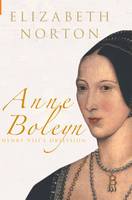 Anne Boleyn: Henry VIII's Obsession Non Fiction by Elizabeth Norton released July 2009 Doomed queen of Henry VIII, mother to Elizabeth I, the epic story of Anne Boleyn.Anne Boleyn was the most controversial and scandalous woman ever to sit on the throne of England. From her early days at the imposing Hever Castle in Kent, to the glittering courts of Paris and London, Anne caused a stir wherever she went. Alluring but not beautiful, Anne's wit and poise won her numerous admirers at the English court, and caught the roving eye of King Henry. Anne was determined to shape her own destiny, first through a secret engagement to Henry Percy, the heir of the Earl of Northumberland, and later through her insistence on marriage with the king, after a long and tempestuous relationship as his mistress. Their love affair was as extreme as it was deadly, from Henry's 'mine own sweetheart' to 'cursed and poisoning *****' her fall from grace was total. |
| |||||||
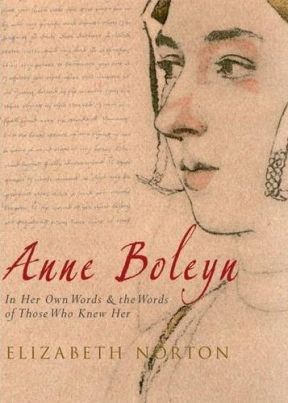 Non- fiction - released March 24, 2011 Anne Boleyn : In Her Own Words & the Words of Those Who Knew Her By : Elizabeth Norton The complete letters, dispatches and chronicles that tell the real story of Anne Boleyn. Anne Boleyn, the second wife of Henry VIII, caused comment wherever she went. Through the chronicles, letters and dispatches written by both Anne and her contemporaries, it is possible to see her life and thoughts as she struggled to become queen of England, ultimately ending her life on the scaffold. Only through the original sources is it truly possible to evaluate the real Anne. George Wyatt's Life of Queen Anne provided the first detailed account of the queen, based on the testimony of those that knew her. The poems of Anne's supposed lover, Thomas Wyatt, as well as accounts such as Cavendish's Life of Wolsey also give details of her life, as do the hostile dispatches of the Imperial Ambassador, Eustace Chapuys and the later works of the slanderous Nicholas Slander and Nicholas Harpsfield. Henry VIII's love letters and many of Anne's own letters survive, providing an insight into the love affair that changed England forever. The reports on Anne's conduct in the Tower of London show the queen's shock and despair when she realised that she was to die. Collected together for the first time, these and other sources make it possible to view the real Anne Boleyn through her own words and those of her contemporaries. |
| |||||||
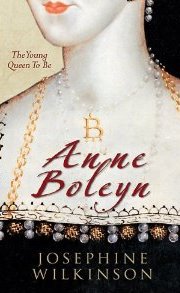 Non-fiction Author :Josephine Wilkinson * Re-release under new title of "The Early Loves of Anne Boleyn" Josephine Wilkinson is an author and historian. She received a First from the University of Newcastle where she also read for her PhD. She has received British Academy research funding and has been scholar-in-residence at St Deiniol's Library, Britain's only residential library founded by the great Victorian statesman, William Gladstone. Her other books include MARY BOLEYN: HENRY VIII'S FAVOURITE MISTRESS, RICHARD III: THE YOUNG KING TO BE and ANNE BOLEYN - as editor of Paul Friedmann's original edition. She lives in York. |
| |||||||
Non fiction (?) about the author : W.S Pakenham -Walsh born in 1868 and at the age of 29 until 52, he acted as Chaplain to the British community in Foochow, China. It was in the library of the Foochow community that Pakenham-Walsh first found books related to Anne Boleyn's enigmatic life and from which he began to compile a summary of her life. On his return to England became a keen scholar and educationalist, as well as being a respected clergyman. He died in 1960 at the age of 92. Join Canon Pakenham-Walsh on his personal journey across psychic channels to find the real Anne Boleyn - a journey, which beneath its psychic and historical drama, demonstrates religious purpose. The Author's deep-rooted fascination for Anne Boleyn first began in 1917 during a missionary trip to China, but it was on his return to England in 1919 that Pakenham-Walsh began to see divine confirmation of his desire to uncover the true Anne Boleyn. Following a prayer at Boleyn's burial site that she might become his guardian angel, Pakenham-Walsh experienced a series of bizarre coincidences. It was these strange incidents which led Pakenham-Walsh to seek clairvoyants, who helped to channel the spirit of Anne Boleyn. Through sessions with psychic mediums, the reader is presented with transcripts and accounts of psychic messages from Anne Boleyn and significant characters within Anne Boleyn's short lifetime. From one of Anne Boleyn's maids, put to death 'for the sake' of Anne Boleyn, to an infuriated Henry VIII, Pakenham-Walsh vividly recounts his experiences in a sympathetic and quaint style. |
| |||||||
<a class="external" href="http://www.amazon.com/Anne-Boleyn-Collection-collection-fascinating/dp/1470038161/ref=sr_1_1?ie=UTF8&qid=1330271047&sr=8-1" rel="nofollow" target="_blank"> 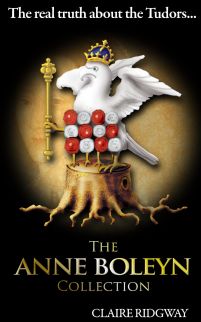 </a> </a>Non-Fiction Written by Claire Ridgway of The Anne Boleyn Files
Written in Claire's easy-going style, but with an emphasis on good history and sound research, these articles are perfect reading for Tudor history lovers everywhere. Discover the REAL truth about the Tudors |
| |||||||
